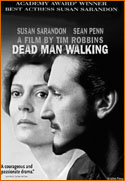By
Margaret D. Smith
![]()




it's a frequently debated question: Can a person of faith interact with popular culture and gain something of value? At the Seattle Pacific University Film Festival, "The Voice of This Calling," five films delivered a rich variety of views on faith and vocation in today's culture.
Moviegoers filled the seats in Upper Gwinn Commons on Saturday, April 5, for each of the three well-known films: "Dead Man Walking," "The Apostle" and "Dogma." On Sunday afternoon and evening, April 6, the documentary "Say Amen, Somebody" and the independent film "Household Saints" drew smaller but still-appreciative audiences. The free festival was organized in part by Image: A Journal of the Arts & Religion, based on campus since 2000.
The theme for the festival was born when Image Editor Greg Wolfe and Assistant Professor of Communication Todd Rendleman brainstormed on a topic that would be, as Wolfe says, "relevant to students, discussion-provoking, but still accessible." They chose five films — some of them controversial — that spanned the spectrum of characters trying to fulfill their callings in their own ways. "Most of the main characters in these films," says Wolfe, "are aspiring to sanctity in everyday life."
According to Wolfe, "We wanted to put on a campus arts event, and we wanted to do it in an appealing, fun way that would intrigue the students. We had hoped the festival would bring about a lot of discussion on faith and vocation, and it certainly did."
After each film, a panel of faculty, staff and students led audience discussions on how the films portrayed faith and vocation. In the gospel singing group film "Say Amen, Somebody," for example, discussion was led by Chris Acker, a student on the Chapel Worship Team; Assistant Professor of Music Ramona Holmes; and doctoral student Anthony Barr-Jeffrey. Participants talked about the film's portrayal of the tension between preaching the gospel and marketing one's art.
Following "The Apostle," some audience members debated how realistically the film portrayed the role of Sonny, a Southern Baptist preacher. Others focused on the conflict between the preacher's own sinfulness and his higher calling. After watching "Dogma," where Bethany, a lapsed Catholic, feels called upon to save the world, filmgoers noted the story's strange, comic view of vocation.
Film fees were paid by the SERVE (Spiritual and Educational Resources for Vocational Exploration) grant from Lilly Endowment Inc., the Office of Student Life and the Associated Students of Seattle Pacific (ASSP). Emily Cochran, ASSP president, was a student panelist. "I love to debate things that are going on in our world with the people here," she says. "Students appreciated the chance to see films that aren't usually part of our classroom material and to talk about faith issues. We could discuss how pop culture interacts with theology."
Seattle Pacific freshman Spencer Smith was particularly glad for the chance to see two of the offerings. "Born in Texas," he says, "I have a slight phobia about Pentecostals like Sonny in 'The Apostle,' but at the same time I know the faith is sincere. Some people thought 'Dogma' was irreverent, but I think God can handle our humor. He's strong enough."
"The films spoke to each other in creative ways," says Rendleman, who helped Wolfe moderate panel discussions. He was pleased with the success of the festival, now slated to become an annual event. "We've got some planning to do to try to create a theme for next year. We're thinking about how to increase visibility next time, so people from all over Seattle will begin to be aware of this as a community film festival."
![]()

"Image is compelling. I've seen nothing like it."
– Bill Moyers, Public Affairs Television Inc.
On May 21, National Book Award winner Barry Lopez will speak at a very special celebration at the Seattle Art Museum. The event marks the formal unveiling in the Pacific Northwest of Image: A Journal of the Arts & Religion.
Based at Seattle Pacific University, Image is one of America's leading literary quarterlies. Each issue features the work of top Christian thinkers, writers and artists. In the Winter 2002 issue, for example, editors Greg and Suzanne Wolfe highlight poet Mary Oliver, artist Tobi Kahn and priest-producer Frank R. Desiderio, who writes on the making of his movie "Judas."
Lopez, widely considered one of America's premier nature writers, is author of Arctic Dreams, for which he received the National Book Award. Of his recent short story collection, Light Action in the Caribbean, The New York Times wrote, "These are quietly astonishing tales, glistening with precision."
The Image unveiling begins at 8:00 p.m. and is free and open to the public. SPU President Philip Eaton will introduce the magazine's editors.
![]()

| Please
read our
disclaimer.
Send any questions, comments or correspondence about Response to
jgilnett@spu.edu or call 206-281-2051. Copyright © 2003 University Communications, Seattle Pacific University.
Seattle Pacific University |